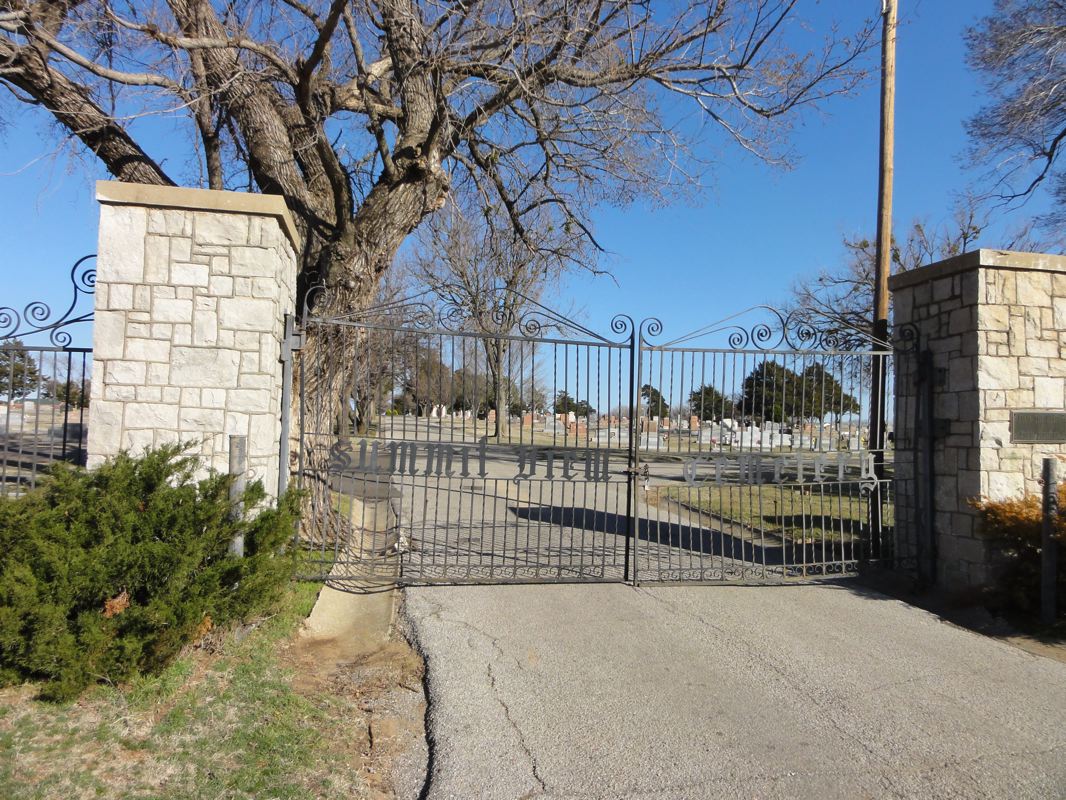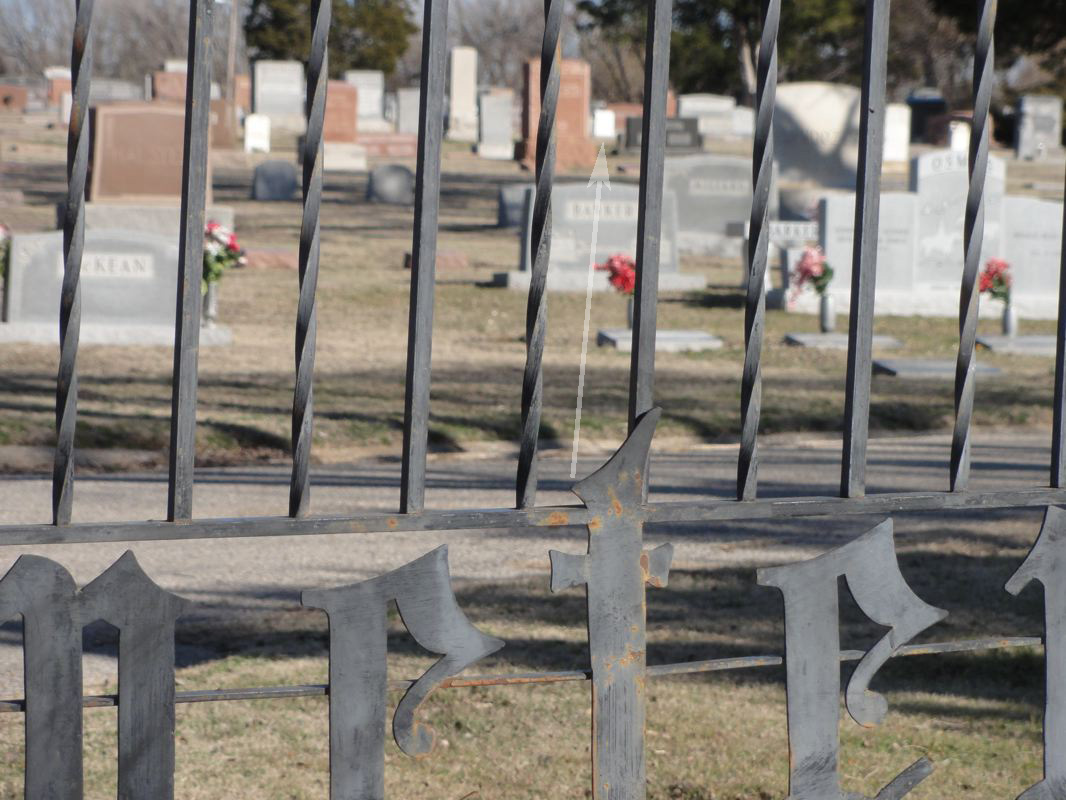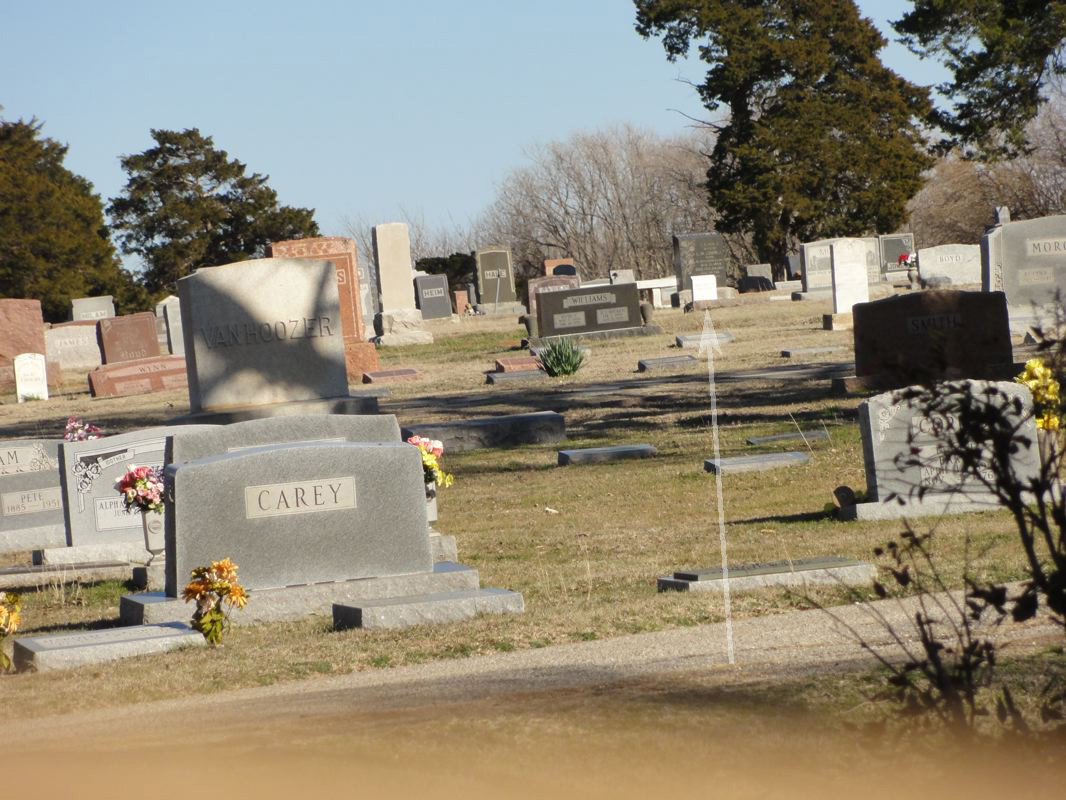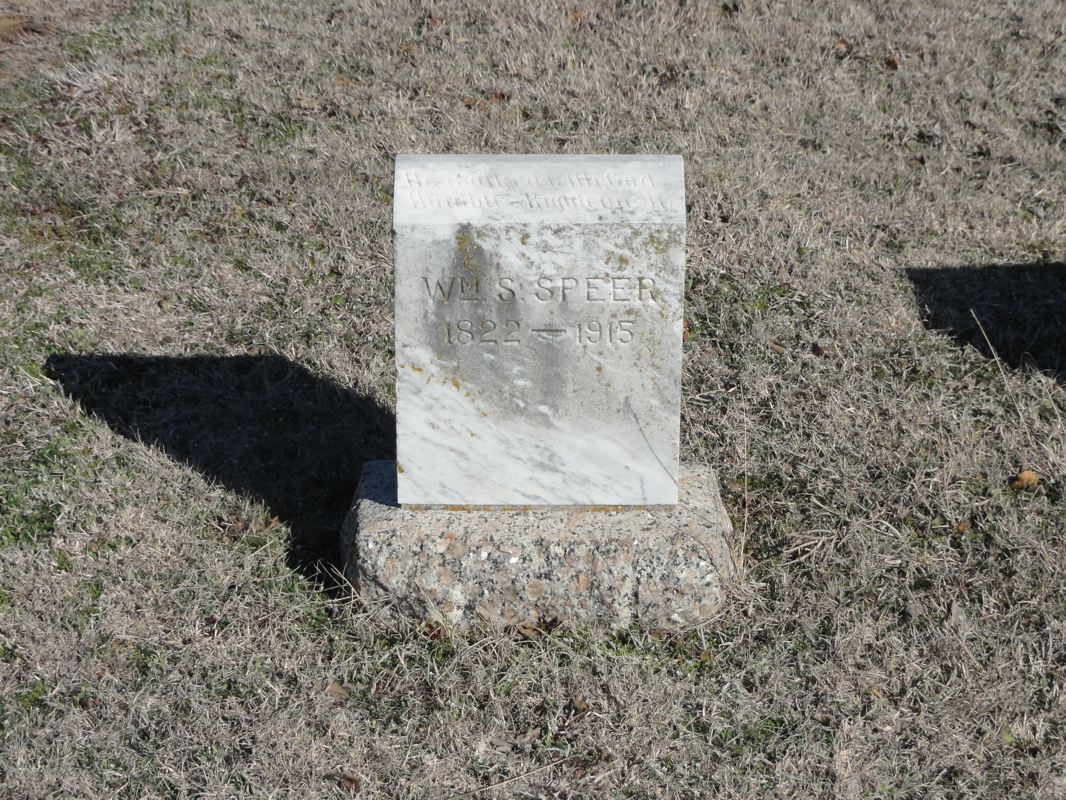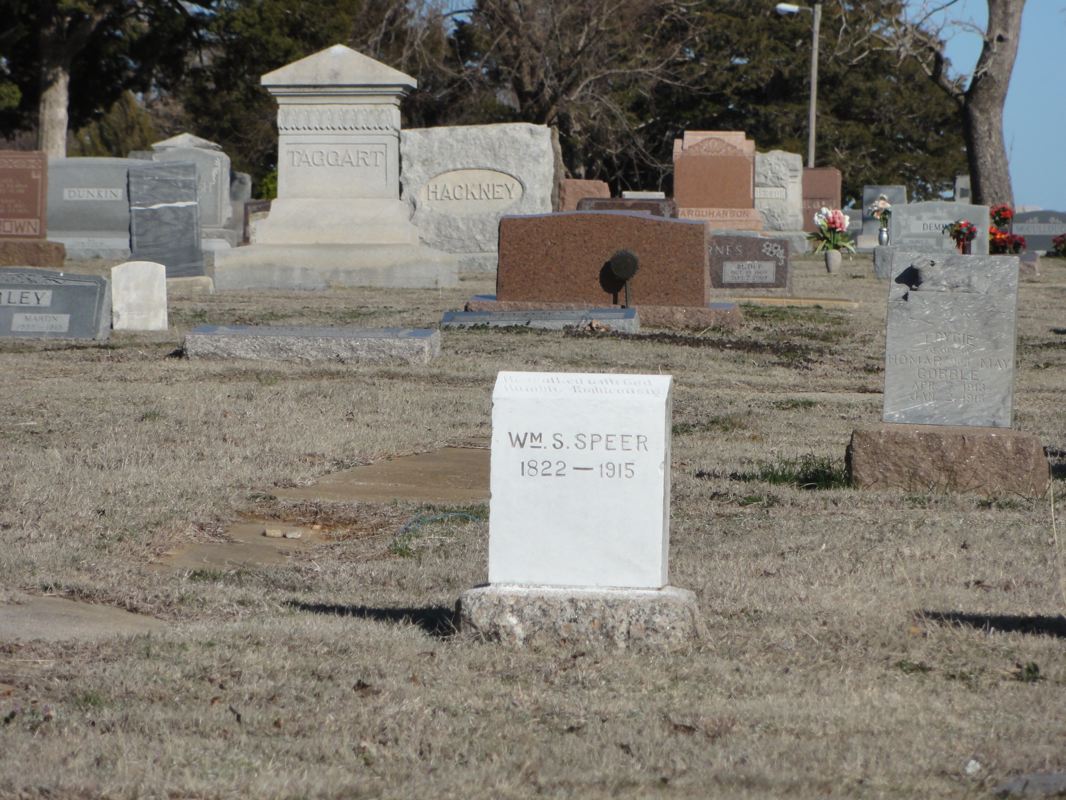William Sheppard Speer
1822-1915
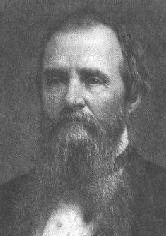
![]()
The Life of William S. Speer
William Sheppard Speer, son of Joshua K. Speer, was born in Williamson County, Tenn., October 6, 1822, and died in the home of his only daughter, Mrs. N. D. McGinley, 618 East Oklahoma Avenue, Guthrie, Okla., at one o'clock, Friday, August 20, 1915, aged nearly ninety-three years. In his youthful days he was a very great student, acquired a fine literary education, and developed into a fine teacher. On the third Lord's day in September, 1843, he was ordained by the leaders of New Hope church of Christ, near Middleton, Hardeman County, Tenn. to preach the gospel, which position he faithfully held to the end of his life in this world.
He was married in Giles County, Tenn., to Miss Mary Ann Nance, daughter of Col. Joseph Nance. To this union were born Charles A., Alex. C. [Alexander Campbell], Henry C. [Clay], and Mary Phebe, the only daughter. In order to prepare more fully to preach, he moved to Bethany College, Brooke County, W. Va., and studied under Alexander Campbell two years (1846, 1847).
On May 12, 1852, his wife died and was buried at Williamsport, Maury County, Tenn., aged twenty-nine years. He remained a widower till his death. He was appointed United States Consul to Africa [Zanzibar] by President Lincoln, which term he served two years (1862, 1863). He was at various times editor of different papers and was author of several books. And in 1880-1882 he compiled an "Encyclopedia of the New West." He also published a very valuable book, entitled "The Law of Success."
He was also professor of astronomy and higher mathematics in a number of colleges. He was an eloquent orator, a fine lecturer, fine home company, and a most excellent Christian gentleman. The world is in need of many such as he. But death takes all, both good and evil. He also authored "Sketches of Prominent Tennesseans."
— A. A. Rose. - Gospel Advocate October 21, 1915, page 1068.
![]()
Millennial Harbinger Reports from W.S. Speer
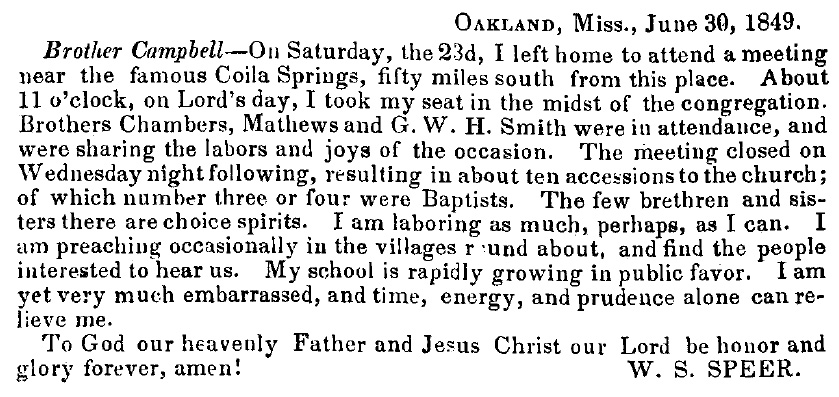
Millennial Harbinger,
1849 p.593
![]()

Millennial Harbinger,
1846 p.239
![]()

Millennial Harbinger, 1855 p.178
![]()
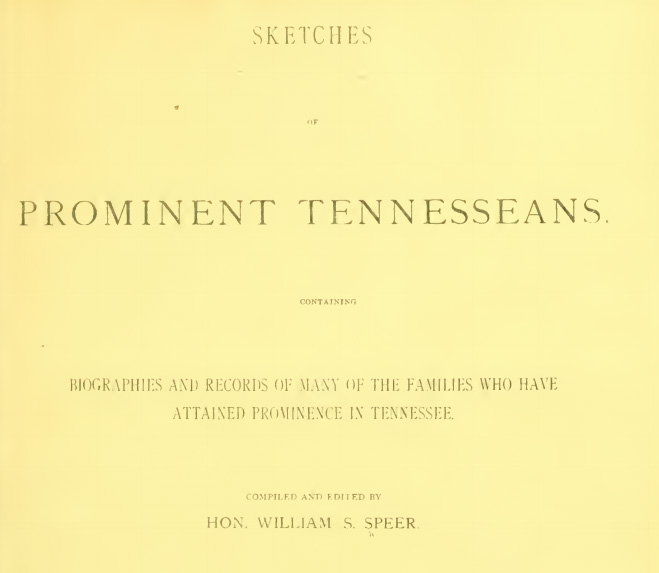
Sketches Of Prominent Tennesseans
Containing
Biographies And Records Of Many Of The Families Who Have
Attained Prominence In Tennessee
Compiles and Edited By
Hon. William S. Speer
![]()
Bad Men
We have received frequent inquiries during the last few years, concerning the Speers. We have sometimes responded to these inquiries, and sometimes have not done so. We have been frequently urged to publish their true character. We have refused hitherto to do so, because they had taken advantage of the sectional strife, and gone North as persecuted men for their politics and were received chiefly on account of this; and we believe a statement of their true character would be considered by those who were upholding them as persecution. We thought, too, that they would soon develop their true characters. After they went off on some hobby from the Church of Christ, we hoped that we would no longer be troubled with them; but we still receive inquires concerning them; and as one of them is now in Tennessee, Imposing on the brethren and clever people: and as we still receive letters from Kentucky and the North, inquiring concerning the others—one of whom (W.S.) still, in places, imposes upon the brethren as a brother, notwithstanding he has professed to leave them—we feel it our duty to make the following statements:
W.S. Speer has not been a member of any congregation for twenty years or more. He was excluded from the Church at Middleton, Miss., we believe, near twenty years ago. He has, on two or three occasions, sought to unite with congregations in this State; but was rejected. His conduct has not been that of a Christian. He has been married three times. Two of his wives are now living in this State, both forsaken by him. He forsook one, whom we never new, without charging a scriptural cause. He then married a sister, whose only crime was marrying Speer, whom she knew to have forsaken a former wife without scriptural cause. (It is a crime of now small magnitude for a Christian to forsake a husband or wife, save for the cause of adultery, and marry another; or for a Christian to marry him or her who so forsakes one to whom he or she has been married. Such a course sets at defiance God's sacred laws, and strikes a fatal blow at the sanctity of the married relation, and demoralizes and corrupts the very fountains of virtue in society. It is adultery, according to God's law.)
He spent her property and forsook her for no other cause than that she has no more property for him. He has been for many years regarded by all who knew him as devoid of common honesty in his pecuniary transactions, and has been guilty of many other crimes against the law of God and society, according to the universal belief of his acquaintances. Were we called on to select a man who had degraded and abused every relationship of life, we know not where to find one who had more thoroughly done this than W.S. Speer.
Dr. A.C. Speer, a younger brother now in Tennessee practicing dentistry, seems to be following the example of his brother. A letter from Vincennes, Ind., Aug. 8, 1868, says: A fellows calling himself Dr. Speer, a sort of dentist, was here three years ago. His profession was gambling, covered by his title of Doctor. He married a widow lady here, induced her to sell her home, and got possession of her money and left her, within a few weeks of marriage; and she says they had no word of difficulty; but she had the fullest confidence in him. He had deposited her money in bank, in his own name, and left home, telling his wife he was going to take his little daughter by a former wife to her mother's friends in Illinois; but he drew his wife's money out of bank, and was in New York before his wife suspected anything wrong. There he took a steamer for Europe, left his daughter in London, and went on to Russian; and returned to Tennessee a year after. His history after he left here is from his brother, W.S. Speer."
He is now in Tennessee. We have seen him, finely dressed, sporting rich jewelry, the proceeds, no doubt, of the property stolen from the woman he betrayed, robbed, and deserted. He professes since to have become a Christian; but when questioned in reference to the above facts, at first denied them. He has, since professing to be a Christian, returned none of the goods stolen from his wife; has not endeavored to make amends for the crimes committed against her, by returning to her and loving an cherishing her, as he pledged himself before God and man in the marriage vow. Of course such a hypocritical pretense of religion will only sink him in deeper infamy in the sight of God and all honest men. The publication of these things pains us sorely. The father of these two men was a good, true, Christian man; proved it through a long life of zeal and self-sacrificing devotion as a Christian teacher. Our first work as a preacher was done chiefly with him. His counsel and advice, and the memory of his affectionate encouragement, together with the recollection of his long, earnest and faithful labors, are sweet to my memory, and will be ever dear to my heart; and much intensifies the pain at being compelled to make the above statements concerning his unworthy sons.
J.K. Speer, Jr., the cousin of the above, has consorted with and sustained W.S. Speer, with a full knowledge of his course—indeed, seems to be much after the same model, in some respects. He maintained a fairly reputable course to the breaking out of the late war; then pandered to every shade of politics; persuaded meant to go into the Rebel army; consulted the writer of this in reference to the propriety of his taking interest in a paper to be entitled the "Southern Confederacy," in certain contingencies. But when the Federal army reached here, was intensely Union. When, by his false and inconsistent course, he had disgusted all his brethren, he left Columbia, then garrisoned by Gen. Negley, with a large Federal army; went North; and for the sake of exciting sympathy, professed to have been driven from his home without even time to take his clothing, which he had deposited with a sister to keep. He afterward tried to induce the military to oppress his brethren that had sustained him, and who, since his endeavors to return to Tennessee, he has testified occupied the same position in politics that he did. He ignores and repudiates his debts to brethren to brethren and others, refusing to pay them. We are not surprised that he, and the others above mentioned, are seeking to believe that the souls of the wicked will pass into eternal forgetfulness, and that there is no place "where the worm diet not and the fire is not quenched." Such an idea must be insupportable to these men. It is natural that such men should see consolation in such an idea.
We have also received letters from Texas, inquiring concerning Gab. Elkins, who is now preaching with some success in Garrant and adjoining counties. We had lost sight of him since the beginning of the war. He once was an acceptable and forcible preacher of the truth. While he understood the theory of the Christian religion, he never seemed to understand that he must practice it. He never subjected his strong animal impulses and self-will to its teachings. He was unruly, "heady," self-willed, uncontrolled by reason or revelation. He preach for a number of years; things did not work to please him; he quit; became wicked, depraved, immoral, and abandoned in his life, as much so seemingly as it possible for men to be. He afterwards joined the Methodists; essayed to preach among them; but knew too much of truth for this; became wicked again; possibly united with the brethren a time or two—as often with the Methodists. The war came on, he went into the arm; we lost sight of him.
He has been an erratic man. His course, we think, chiefly arises from his self-willed, ambitious temper and ungovernable passions. We think in his worst days he respected at least the truth, and could not preach error when he tried. Whether he was restored to the congregation in Cannon County we have never learned, brethren at Woodbury can tell. This word we wish to say in reference to such cases: There is a fault in our Churches, in that we fail too often to condemn the sin, and in condemning it save the sinner. Elkins has done wrong—sinned grievously—yet we are all liable to do the same thing. If he is penitent of his course, if he is anxious to do better, he ought frankly and publicly say so—change his whole course in a manly, Christian way. While condemning his course, we should encourage the man to a better, purer, higher life; if he is trying to do better, receive him, encourage him. A concealment of his former course is not necessary to this. Paul never concealed his sin of persecuting the Church, but confessed it always; and in earnest, self-sacrificing life showed how deeply, sorely he repented that course. So with us, if we sin let us never try to conceal that sin, but confess it, and show by an earnest, faithful life how we loath the sin, how far we have turned from it. Our brethren, when we thus show our repentance, must not, cannot, follow us with condemnation and hound us down with bitter calumny for sins now repented of and forsaken, but must and will receive us if they are Christians, kindly encourage us and sustain us in our efforts to do good. We have never been able to sympathize with that excessive jealousy that suspects every man that we do not know, as an impostor and that forever persecutes a man for his past errors. If a man preaches Christ we rejoice in it. We should maintain such a degree of purity in our own lives that even the imposition of a bad man will not injure us. Some men have characters for virtue so decided that they can enter a grocery, or even a darker den of infamy, without danger of suspicion of evil on their part; others, of more doubtful character, cannot be seen in association with evil without evil being suspected. Christians, as a whole, should maintain such character for purity and holiness that an occasional imposter in their midst will not tarnish the purity of the character they compel others to accord them. Then they may lay aside all that nervous sensitiveness, so common to them, for fear somebody will preach who has done wrong, and cause them to rejoice in the truth, by whomsoever preached. While the course of all these men herein mentioned are to be condemned, severely condemned, should they repent—in an open, manly way confess their wrongs—strive to undo them to the extent of their abilities, by returning the property and caring for the woman they have betrayed and outraged, they should certainly be encouraged.
If Bro. Elkins is trying to live a Christian life now—if he has forsaken his wicked ways, trying humbly, with help from on high, to control his feelings and passions—he should certainly be encouraged, and his talents should be diligently, earnestly used in extending and making reparation to the cause he has sinned against and injured.
—D.L., Gospel Advocate, Vol. X, #37, September 10, 1868, pages 865-868
—Editor's Note: Contrast should be quickly seen between the article here added to the site which was written in 1868, and the obituary reported in 1915 at the top of the page. While it is not evident what effort was made on the part of W.S. Speer to make things right, as he was kindly appealed to do by the editor of the Gospel Advocate in 1868, it appears that by the end of his life he had made some significant changes.
![]()
Directions To The Grave of W.S. Speer
William S. Speer is buried in the Summit View Cemertery in Guthrie, Oklahoma. Guthrie lies north of Oklahoma City off of I-35. Take I-35 to Exit 157/ Hwy. 33 and head west. Turn right on N. Pine Street. Go less than a mile and the cemetery will be on your right. Enter the main gate and go to the third drive and turn right. About midway of the section look to your left. If you pass the two trees you have gone too far. The grave is there on the left. Plot: Sec1-Blk35-Lot61-SpcNE. While in the cemetery, be sure to visit the grave of A.E. Freeman, another gospel preacher.
GPS Location
35.895616,-97.406353
View Larger Map
![]()

He walked with God
Humbly - Righteously
William S. Speer
1822-1915
![]()
Photos Taken February 26, 2012
Courtesy of Scott Harp
www.TheRestorationMovement.com
Web editor note: In February, 2012, it was my privilege to visit the grave of W.S. Speer. I was invited to take part in the annual Affirming The Faith Lectureship in Oklahoma City, Oklahoma. Getting into the area early, I was afforded the opportunity to put about 2000 miles on a rental car in order to locate graves of gospel preachers and church leaders of yesteryear in a wide area. My seventh day I was able to visit the grave of William S. Speer.
![]()
